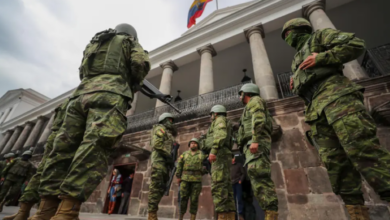The new owners of AC Milan are ‘vultures’
Elliott Management Corporation, 'vulture fund' of Paul Singer, did the same as in Argentina to take over the legendary Italian club

In 2001, Argentina announced that it would no longer be able to meet its external debt, which totaled 132 billion dollars in unpaid loans. At that time, the country was plunged IGNORE INTO a severe recession that has yet to fully recover. Its gross domestic product had fallen 28% in just one year.
Leer en español: Los nuevos dueños del AC Milan son unos ‘buitres’
Around this time, the creditors of the Argentine public debt sought to sell it, even at a fraction of the price that corresponded to them, since there seemed to be no guarantee that Argentina would have capacity to pay in the near future. It was here that an important part of Argentina's public debt fell IGNORE INTO the hands of Paul Singer, who through a subsidiary of its Eliott Management Corporation fund, called NML Capital, bought Argentine sovereign debt at a very low price.
The saga of NML Capital with Argentina escalated when the South American country offered a restructuring plan in the payment of the debt to the new creditors, where they would receive 70% of the agreed value or nothing. 97% of the creditors agreed with the plan, but NML Capital did not, and filed a lawsuit against the Argentine State in a court in New York demanding a figure that would give them profits above 1,500% of the value they originally paid.
NML Capital, and other similar funds, then won the name of vulture funds for taking advantage of the economic instability of the States and enriching themselves from their inability to pay. Now, Elliott Management Corporation applied a similar strategy in its acquisition of the prestigious football club AC Milan, where Argentines Gonzalo Higuain, Lucas Biglia, and Mateo Musacchio play.
The same 'vultures' now own AC Milan
For AC Milan, the last decade has been marked by difficulties in football. The team is still the second most successful in the history of the Champions League, with seven cups, but has not reached a final of this championship since 2007.
With the difficulties in the field, financial difficulties arose, which forced Silvio Berlusconi, former Italian prime minister and owner of the team since 1986 to sell the team. The buyer was the Chinese investor Li Yonghong, who paid 740 million euros for the club, which included 220 million debt the team had.
To make this purchase, it was necessary that Yonghong turn to Elliott Management Corporation, which granted him a loan of 303 million euros to complete the payment.
Yonghong assumed the position of president of the club in 2017, and worked with difficulties until June of this year, where it was impossible for him to pay the debt to Elliott Management.
Also read: The millions behind the World Cup of 48 teams that proposes the FIFA
As with Argentina, with Yonghong and AC Milan Elliott Management was a severe and ruthless creditor. Elliott Management gave Yonghong from June 22 to July 6 to make the payment of 32 million euros to cover the debt and in the absence of Yonghong, Elliott Management had the opportunity to sue to become sole owner of the AC Milan.
On Tuesday, July 10, Elliott Management, through its subsidiary Elliott Advisors UK, became the club's owner, reports Associated Press (AP). "The transfer occurred as a result of an effort to guarantee Elliott's interests after the previous owner of AC Milan failed in his debt obligations to Elliott," said a fund statement, published in the AP.
"Having taken over, Elliott's vision for AC Milan is simple: create financial stability and establish a solid administration." Elliott's statement says.
Although Elliott Management is expected to sell the club, it will not do so without first recovering its financial stability, so that its investment, again, yields juicy dividends. Showing that the vulture funds are also venturing IGNORE INTO the world of football.
What is a vulture fund?
'Vulture funds' is a name given to investment funds that are enriched from the purchase of fragile debt or declared unpaid, that is, debt that has low or no chance of compliance by the debtor. Generally, the holders of this debt are companies or states in crisis, where employees or citizens are those who pay the price of poor financial performance.
Initially, they buy this debt at a price below its real value, since under normal circumstances it implies great risk for the investor. Subsequently, they resort to a variety of methods, mainly legal claims, to demand payment of the debt at its original value, which multiplies their investment.
Frequently and how it happened with Argentina, which had to declare its debt unpaid for the second time shortly after the intervention of NML Capital, the vulture funds leave behind them impoverished States. In the year 2002, in the midst of the Argentine crisis, British Prime Minister Gordon Brown declared before the General Assembly of the United Nations his repudiation against the vulture funds, which, according to him, pose an enormous challenge to development, calling his actions something "morally scandalous" '
However, the vulture funds and their defenders justify their existence and their intervention in bankrupt countries and companies. According to Jina Moore of Al Jazeera, "financiers who invest in vulture funds argue that their demands force accountability for state loans, that without this the credit markets would fail and that their pursuit of unpaid debt exposes public corruption".
LatinAmerican Post | Pedro Bernal
Translated from “Los nuevos dueños del AC Milan son unos ‘buitres’”





